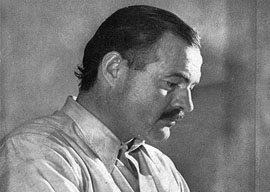
January 20, 2017

Ernest Hemingway
Source: Wikimedia Commons
In one respect, however, the story looks a bit different now. Hemingway was afraid, repeatedly saying that the FBI and the IRS were following him, spying on him, monitoring his movements and conversations. Hotchner and other friends thought he was suffering from delusions, and I guess most readers went along with this. Well, now we know that, while he may indeed have been somewhat paranoid, he had good reason to be so. The release of FBI files makes it clear that the Bureau had been watching him for years; he was an object of suspicion to J. Edgar Hoover. Why? Well, he might have been America’s greatest living writer, the best-known one anyway, and he was certainly a patriotic American, but to Hoover and the Bureau he was suspect as a man of the left.
He had backed and raised money for the Republicans in the Spanish Civil War, even after the Russian-backed communists had come to dominate the Loyalist war effort. This got him labeled a “premature anti-fascist,” a bad thing to be in the eyes of the Bureau. Premature anti-fascists were deemed to be Red sympathizers. Hemingway actually does not seem ever to have had any great interest in either the Soviet Union or communism, but in Cuba, where he mostly lived in the “40s and “50s, his detestation of the brutal American-backed Batista dictatorship led him to donate money to the Cuban Communist Party, and then to welcome Batista’s replacement by Fidel Castro. I daresay if Hemingway had lived long enough his enthusiasm for Castro would have faded quickly, but his initial support for the new regime was enough to persuade the FBI to intensify its surveillance.
No wonder that, already confused and unhappy, Hemingway should have become desperate and killed himself. The trouble with the spooks everywhere is that they interpret the national interest so narrowly, and refuse to recognize that a patriot may have good reason to dislike and oppose his country’s government and ruling elite.